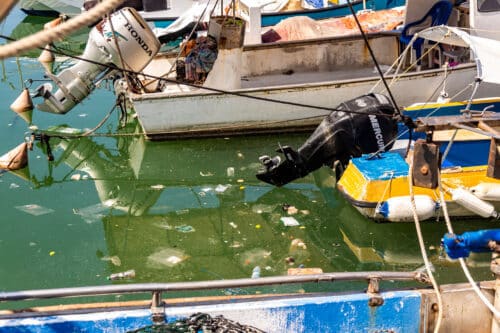This is according to the national monitoring report of marine waste for 2019 of the Ministry of Environmental Protection and the Seas and Lakes Research Institute; At the coastal sites, previously unseen details appeared, such as masks and gloves

The Ministry of Environmental Protection publishes the national monitoring report of marine debris for 2019, in which for the first time, marine debris was also monitored in Eilat. The national monitoring report is carried out by the Israel Seas and Lakes Research Institute and jointly funded by the "Clean Beach" program of the Ministry of Environmental Protection and the Ministry of Energy as part of Israel's national monitoring, for the fourth year in a row.
The report, signed by a team led by Dr. Yael Segal, summarizes a year of monitoring waste on the beaches, waste floating in seawater and waste accumulated on the bottom, and the main findings that emerge from it are:
• At the bottom of the Mediterranean Sea, at a water depth of between 20 meters and 1,700 meters, mainly pieces of bags and food packaging were observed. A particularly high concentration is found at a water depth of 200-500 meters (4,000-10,000 individuals per square meter). Near the coast, the waste concentrations were significantly lower and an increase in the waste concentration was observed after the rainy season. Therefore, it can be estimated that in contrast to the main source of waste on the beaches, which is the bathers, the main impact in the sea is from the waste of the cities flowing in the drainage canals and in it surface runoff from all the areas of the authorities as well as from the streams flowing to the sea.
• The findings of floating debris particles indicate a significant difference between Eilat and the Mediterranean Sea. Both in Eilat and in the Mediterranean you can find plastic particles smaller than 5 mm, but in Eilat you cannot find larger plastic particles. The origin of the plastic particles larger than 5 mm are waste that decomposes over time on land, for example on the banks of streams, and then is washed into the sea during rain events. Small particles originate mainly from plastic that has been in the sea water for a long time, as these particles are transported from a distance by currents. The absence of streams flowing into the Gulf of Eilat can explain the absence of microplastics there.
• Similar to the bottom of the sea, the floating waste in the Mediterranean Sea and the Red Sea is mainly composed of parts of bags and packaging (about 70%), and most of it is micro-plastic in size (0.3-5 mm). In 2019, 0.7-13 million microplastic particles were found floating in the square meter - a high concentration, compared to the western Mediterranean.
• Most of the floating microplastic particles found in the monitoring, between 50% and 80%, were white or transparent in color. White or clear plastic has a higher potential to cause ecological damage due to the tendency of animals to ingest it as it resembles the types of food that float in the sea.
• In beach sampling carried out in 2020, during the Corona period, new items of waste appeared such as masks and gloves, which had not been observed before.
• At the coastal sites, 400-1,000 pieces of waste were sampled in a section of 100 meters of beach, an amount lower than the global average. The gap probably stems from the ongoing cleaning operations of the beaches in Israel, including the open beaches, also within the framework of the Ministry of Environmental Protection's "Clean Beach" program, under which the Ministry supports the coastal authorities with approximately NIS 10 million. About 75% of the waste originates from plastic waste.
• In order not to damage the coral reefs and sea grass mats in Eilat, no waste was monitored on the seabed there this year. In order to deal with this limitation, the 2020 monitoring will use an underwater robot that will perform a photographic survey to locate debris on the bottom. The findings of this survey will be presented during 2021.
The phenomenon of waste in the sea and on the beaches is a global problem and affects the beaches of the entire world. According to various estimates, about 8 million tons of plastic are thrown into the seas and oceans every year.
As a member state of the Barcelona Convention, the State of Israel is committed to the regional reduction plan for marine and coastal waste. According to this plan, the member states are required to take a long series of actions to minimize the dimensions of the marine waste phenomenon and its harmful effects on the marine environment of the sea and the population living on its shores. The "Clean Beach" program of the Ministry of Environmental Protection works to minimize the amount of marine waste in Israel and to clean the beaches and the sea in accordance with the international commitment, for the benefit of the environment and the public in Israel.
More of the topic in Hayadan:
